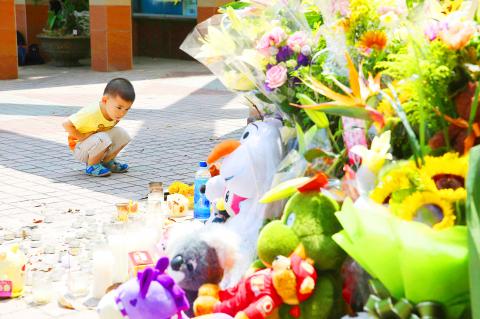President Ma Ying-jeou (馬英九) yesterday said the government cannot abolish capital punishment because society needs time to reach a consensus on the issue, according to Presidential Office spokesman Charles Chen (陳以信).
Chen’s remarks came after some observers interpreted a comment by Ma a day earlier as a sign that his administration might be considering abolishing the death penalty.
Asked about increased calls against ending the death penalty after an attack on an eight-year-old girl in a school bathroom in Taipei’s Beitou District (北投) on Friday, Ma said that two views he described as “opposing” have been debated for some time: Some people believe that capital punishment does not deter crime, while others believe that abolishing the death penalty would encourage crime.

Photo: CNA
“I think we better observe this for some more time,” Ma said.
Chen yesterday quoted Ma as saying that the government is unable to scrap capital punishment at the moment, but would continue to work toward reducing its application.
When meeting recently with a British parliamentary group in favor of the abolition of the death penalty, Ma said that the majority of Taiwanese are against ending capital punishment, Chen said.
The president also referred to a 2012 Ministry of Justice poll in which 76.7 percent of respondents opposed scrapping the death penalty, while more than 85 percent believe that abolishing the death penalty would affect public security, Chen said.
Meanwhile, the Democratic Progressive Party (DPP) said that further dialogue with those who advocate abolishing capital punishment is needed in the wake of the slaying of the second-grader.
Every child is the darling of their parents and the party was saddened by the tragedy, DPP spokesman Wang Min-sheng (王閔生) said, adding that all children should be able to study in an environment free from fear.
Complex and serious social problems were behind the killing, not just the issue of campus security, Wang said.
On the abolition of the death penalty, there are still deficiencies in the complementary measures of the current law, and also different views in society regarding the issue, he said.
“We need to have further dialogue and communication,” he said.
The suspect in the slaying, Kung Chung-an (龔重安), 29, reportedly said he was under great pressure and suffering from auditory hallucinations at the time of the incident.
His elder brother said Kung moved out of the family home five years ago.
He did not know how a previously normal person could turn into a killer, the brother added.

Taiwan is projected to lose a working-age population of about 6.67 million people in two waves of retirement in the coming years, as the nation confronts accelerating demographic decline and a shortage of younger workers to take their place, the Ministry of the Interior said. Taiwan experienced its largest baby boom between 1958 and 1966, when the population grew by 3.78 million, followed by a second surge of 2.89 million between 1976 and 1982, ministry data showed. In 2023, the first of those baby boom generations — those born in the late 1950s and early 1960s — began to enter retirement, triggering

ECONOMIC BOOST: Should the more than 23 million people eligible for the NT$10,000 handouts spend them the same way as in 2023, GDP could rise 0.5 percent, an official said Universal cash handouts of NT$10,000 (US$330) are to be disbursed late next month at the earliest — including to permanent residents and foreign residents married to Taiwanese — pending legislative approval, the Ministry of Finance said yesterday. The Executive Yuan yesterday approved the Special Act for Strengthening Economic, Social and National Security Resilience in Response to International Circumstances (因應國際情勢強化經濟社會及民生國安韌性特別條例). The NT$550 billion special budget includes NT$236 billion for the cash handouts, plus an additional NT$20 billion set aside as reserve funds, expected to be used to support industries. Handouts might begin one month after the bill is promulgated and would be completed within

NO CHANGE: The TRA makes clear that the US does not consider the status of Taiwan to have been determined by WWII-era documents, a former AIT deputy director said The American Institute in Taiwan’s (AIT) comments that World War-II era documents do not determine Taiwan’s political status accurately conveyed the US’ stance, the US Department of State said. An AIT spokesperson on Saturday said that a Chinese official mischaracterized World War II-era documents as stating that Taiwan was ceded to the China. The remarks from the US’ de facto embassy in Taiwan drew criticism from the Ma Ying-jeou Foundation, whose director said the comments put Taiwan in danger. The Chinese-language United Daily News yesterday reported that a US State Department spokesperson confirmed the AIT’s position. They added that the US would continue to

IMPORTANT BACKER: China seeks to expel US influence from the Indo-Pacific region and supplant Washington as the global leader, MAC Minister Chiu Chui-cheng said China is preparing for war to seize Taiwan, Mainland Affairs Council (MAC) Minister Chiu Chui-cheng (邱垂正) said in Washington on Friday, warning that Taiwan’s fall would trigger a regional “domino effect” endangering US security. In a speech titled “Maintaining the Peaceful and Stable Status Quo Across the Taiwan Strait is in Line with the Shared Interests of Taiwan and the United States,” Chiu said Taiwan’s strategic importance is “closely tied” to US interests. Geopolitically, Taiwan sits in a “core position” in the first island chain — an arc stretching from Japan, through Taiwan and the Philippines, to Borneo, which is shared by